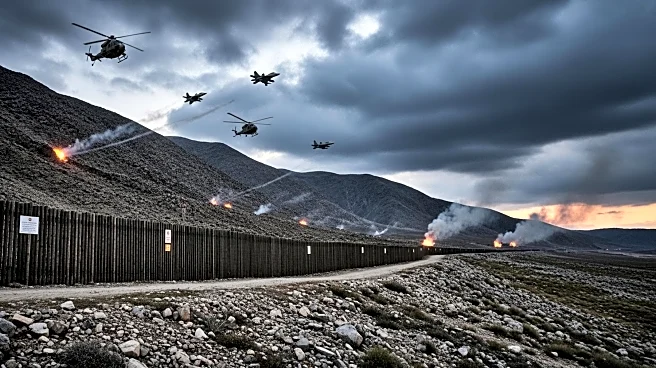What's Happening?
Afghanistan's Taliban forces have initiated armed reprisals against Pakistani soldiers along the shared border, accusing Islamabad of conducting air strikes on Afghan soil. The clashes are reported to be ongoing in several provinces including Kunar, Nangarhar, Paktia, Khost, and Helmand. The Taliban claims these actions are in retaliation for the air strikes by Pakistani forces. The Afghan military has stated that Taliban border forces engaged in heavy clashes against Pakistani posts in various border areas. Pakistan has not confirmed its involvement in the air strikes but has urged Kabul to stop harboring the Pakistani Taliban (TTP), which is accused of killing hundreds of Pakistani soldiers since 2021.
Why It's Important?
The escalation of violence between Afghanistan and Pakistan highlights the fragile security situation in the region. The Taliban's accusations against Pakistan and the subsequent military engagements could further destabilize the border areas, impacting regional security and diplomatic relations. The presence of the TTP in Afghanistan and its alleged attacks on Pakistani forces add complexity to the situation, potentially straining relations between the two countries. This conflict could affect U.S. interests in the region, particularly in terms of counter-terrorism efforts and maintaining stability in South Asia.
What's Next?
The ongoing clashes may lead to increased military activity along the Afghanistan-Pakistan border, with potential for further escalation. Both countries might engage in diplomatic talks to de-escalate tensions, although mutual accusations could hinder progress. The international community, including the U.S., may need to intervene or mediate to prevent further deterioration of relations and ensure regional stability.
Beyond the Headlines
The conflict raises questions about the Taliban's governance and its ability to control militant groups within Afghanistan. The situation also underscores the challenges faced by Pakistan in managing its border security and dealing with insurgent groups. Long-term implications could include shifts in regional alliances and increased military presence by neighboring countries.








